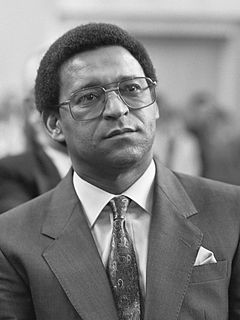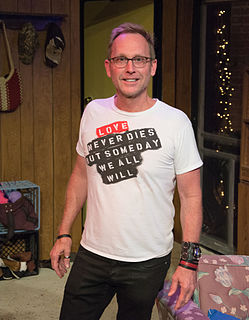A Quote by Elie Wiesel
Take the story of Cain and Abel. Why were we given that story? Scientifically, you may have an explanation for it, but I'm not approaching it from the scientific point of view. I'm saying: Why do we need that? It's a sordid story, a depressing story, a dark story. Why should I believe that I'm a descendant of either Cain or Abel? Thank God there is a third son! [Genesis 4:25]
Related Quotes
I may be a descendant of Seth. I say to myself, What does [the story of Cain and Abel] teach me? So I go back to all the interpretations in the Talmud, which to me are a source of pleasure and joy. Then I say, maybe this story is not for then; maybe it's for now! It's possible for brothers to kill one another in civil wars. But most important, whoever kills, kills his brother. That's a moral conclusion that may not be there; but that must be my conclusion. Otherwise, why read it? Whoever kills, kills his brother.
The Universe story is the quintessence of reality. We perceive the story. We put it in our language, the birds put it in theirs, and the trees put it in theirs. We can read the story of the Universe in the trees. Everything tells the story of the Universe. The winds tell the story, literally, not just imaginatively. The story has its imprint everywhere, and that is why it is so important to know the story. If you do not know the story, in a sense you do not know yourself; you do not know anything.
So tell me, since it makes no factual difference to you and you can't prove the question either way, which story do you prefer? Which is the better story, the story with animals or the story without animals?' Mr. Okamoto: 'That's an interesting question?' Mr. Chiba: 'The story with animals.' Mr. Okamoto: 'Yes. The story with animals is the better story.' Pi Patel: 'Thank you. And so it goes with God.
Vera said: 'Why do you feel you have to turn everything into a story?' So I told her why: Because if I tell the story, I control the version. Because if I tell the story, I can make you laugh, and I would rather have you laugh at me than feel sorry for me. Because if I tell the story, it doesn't hurt as much. Because if I tell the story, I can get on with it.
The biggest threat to your creativity is the fear that it's already been done, said, created. (So why bother?)
Say it, do it, make it anyway - but tell YOUR story along the way.
The story of how you came to know what you know.
The story of what you want to know more of.
The story of why you do what you do.
The story of how you came to care.
And that's how you create what's never been created before.
We all want explanations for why we behave as we do and for the ways the world around us functions. Even when our feeble explanations have little to do with reality. We’re storytelling creatures by nature, and we tell ourselves story after story until we come up with an explanation that we like and that sounds reasonable enough to believe. And when the story portrays us in a more glowing and positive light, so much the better.
If the point of life is the same as the point of a story, the point of life is character transformation. If I got any comfort as I set out on my first story, it was that in nearly every story, the protagonist is transformed. He's a jerk at the beginning and nice at the end, or a coward at the beginning and brave at the end. If the character doesn't change, the story hasn't happened yet. And if story is derived from real life, if story is just condensed version of life then life itself may be designed to change us so that we evolve from one kind of person to another.




































